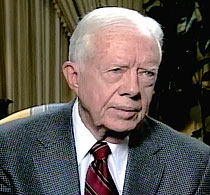2006年VOA标准英语-Former President Talks About his Controversial
搜索关注在线英语听力室公众号:tingroom,领取免费英语资料大礼包。
(单词翻译)
By Kane Farabaugh
Chicago, Illinois
11 December 2006
watch Carter Palestinian report
The recent report of the Iraq Study Group says the Israeli-Palestinian issue is key to greater peace in the Middle East. That search for peace was a hallmark of former U.S. President Jimmy Carter's administration in the late 1970s.
Now, almost three decades after he helped broker1 peace between Israel and Egypt, the former president and Nobel Peace Prize winner is again setting his sights on the Middle East in his new book, "Palestine: Peace not Apartheid." The book has generated controversy2 for its criticism of the Bush administration and for recent allegations of plagiarism3. But President Carter, a Democrat4, hopes the book will raise awareness5 in the United States about the Palestinian issue. In an interview with VOA, he spoke6 about his disappointment with current events in the region.

Jimmy Carter
(watch complete interview - broadband)
(watch complete interview - dialup)
It was a moment that defined President Jimmy Carter's foreign policy initiatives: the Camp David accords that brought peace between Egypt and Israel in 1979.
Th accords also outlined ways to achieve a Palestinian state and further peace in the region; something President Carter says has evaporated in recent years.
"In the last six years, since Bill Clinton left office, there hasn't been one single day of negotiations7 or peace effort made between the Israelis and the Palestinians,” said Mr. Carter. “And the whole world, particularly the Muslim world, feels that the United States has taken a completely biased8 attitude towards circumstances and do not and does not care as a government about what happens to the Palestinians."
The charge the Bush administration has not done enough to foster peace between Israel and the Palestinians was disputed by President Bush Thursday during a news conference with British Prime Minister Tony Blair. In response to a reporter, President Bush restated his commitment to a two-state solution for resolving the Israeli-Palestinian conflict.
"Our secretary of state [Condoleezza Rice] is very much engaged in this issue. She works hard on the issue,” said Mr. Bush. “And as much as we'd like to impose the settlement, it's important for you to understand, sir, that the Israelis and the Palestinians must accept responsibility and must sign off on an agreement."
Concern about the Palestinian issue is the driving force behind President Carter's latest book "Palestine: Peace not Apartheid," his 21st published work. He says the books give him a voice on important issues. "The main thing they do for me in a very controversial arena9 like Palestine, is to give me a forum10 to discuss that situation and maybe to bring it to the attention of readers and listeners and viewers of this program that I wouldn't otherwise have."
But this book has ignited controversy for the use of the word "apartheid" in the title. President Carter feels the term accurately11 reflects the way Israel treats the Palestinians in the Occupied Territories.
Israel has refused to negotiate with the Hamas-led Palestinian government because of its refusal to recognize Israel and renounce12 violence. The Israeli government has also stated it has a right to defend itself against Palestinian rocket and terror attacks.
The Simon Wiesenthal Center, a Jewish human rights organization, has weighed in on the book, and says President Carter "abandons all objectivity and unabashedly acts as a virtual spokesman for the Palestinian cause."
Mr. Carter answered that charge. "They are horribly persecuted13 by the Israelis to deprive them of their basic human rights and this is a fact that is not known and is not debated in this country. In Israel it is debated intensely every day. In Europe and in other parts of the world the whole issue is known and understood and at least discussed. In the United States, this discussion is almost completely absent, and that is why I wrote this book."
This book is also in the spotlight14 for other reasons. Emory University professor and Middle East scholar Kenneth Stein resigned his position as a fellow at The Carter Center in Atlanta over the book, reportedly accusing Carter of plagiarism and factual omissions15.
Amid the controversies16, Carter explains his book outlines the plight17 of the Palestinians since the founding of the Jewish state of Israel in 1948, through the current conflict in Lebanon this summer.
President Carter has long advocated Israel's right to exist in the Middle East. But he is also an outspoken18 critic of the recently constructed wall that now separates parts of Israel and the West Bank. He says numerous trips throughout the region have led him to the conclusion that most Israelis favor a withdrawal19 from Palestinian territory in exchange for a lasting20 peace.
"Over a period of time though, because a minority of Israeli leaders have wanted to take and hold Palestinian land, that peace effort has been subverted21."
In "Palestine: Peace not Apartheid," Carter says the United States, along with Russia, the United Nations, and the European Union, must implement22 the Bush administration's so-called "Roadmap for Peace."
Former President Carter, now 82, is determined23 to continue making an impact on the world stage in the cause of peace. He plans to write two more books to be released next year.




